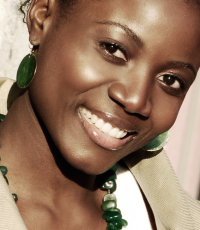Thursday, April 26, 2007, seemed grim; a rainy day with its usual melancholic skies in New York City. But somewhere in Mid–town Manhattan at Sun West Studios, dim lights danced alongside good music in a night of silent auction during the launch reception of African Health Now, a non-profit organization determined to educate African immigrants in the U.S. and those back home about specific health issues. Nana Eyeson, Essence Bookings Editor and master-mind behind the movement hosted the event attended by over 100 guests.
In May 2005 Eyeson’s father suffered a heart attack in Ghana and was hospitalized. During this period she came face-to-face with some of the challenges many Ghanaians in her position living abroad endured: unsuccessful attempts to receive information about her father’s condition from doctors attending to him.
Shortly after the attack, Eyeson went to visit her father in Ghana and began to investigate the health care system in the country. She realized that many Ghanaians had little or no knowledge about certain health issues and had limited or no access to valuable information relevant to their health.
“I felt that the average Ghanaian living in Ghana, having never left Ghana [didn’t] really have the accessibility to just say ‘how do I change my eating habits? If I exercise, what kind of exercise? What is diabetes? What is [my] blood pressure level? What is my cholesterol level?’ Those little things that living in America you get inundated with, and that information is constantly readily available to you, it’s not readily available to the average Ghanaian,” she says.
When Eyeson learned that her father’s neighbors had been instrumental in his recovery process, she decided to do something for them to show her gratitude. Not foreign to volunteer work, education and philanthropy, she found herself rekindling with that passion.
That desire to show her appreciation developed into brainstorming ideas: to coordinate a group to participate with her in a volunteer effort to provide the community with health services that were lacking in Ghana. “By the Christmas ending that I came back to New York, I still had that fire in me, I was still thinking about it,” she says.
After receiving positive feedback from friends she had inquired about volunteering, Eyeson was set to make that a reality and African Health Now was established. The organization’s mission is to “promote the health and health care of Africans by providing community education, access to resources and strengthening their social networks.”
In December 2006, Eyeson and 21 friends from the United. States. and London comprising of doctors and individuals ready to help, went to Ghana. On December 26 the group organized their first health fair in Pokuasi, Accra, called “A Gift of Life at Christmas,” an event that offered free public dental, glucose and blood pressure screenings. They also provided health lessons including a breast exam class that taught women to conduct their own self-evaluations. “They had no idea. They’re not going to the GYN, [it’s] not something that’s readily available,” Eyeson says of the condition in Ghana. By the end of the day, she and her team had fed valuable information to about 300 people and provided them with health services they needed.
“This was my first time back in 21 years. I was extremely blessed to be a part of something so great. For many years, I have coordinated and participated in health fairs in the states. This experience has taken me to a new level in outreach and in God. I felt renewed and charged. A lot of hard work when into this project. We plan to do bigger and better things this year,” says Beulah Afoakwa, a board member of the organization.
Gabrielle Saylor, a volunteer from the trip adds, “The doctors, organizer, and volunteers were mostly Ghanaian natives, who now live in the U.S. and to see them helping children who one day may become them was truly a moving experience.”
“Also the children and the elderly were so grateful for the gifts, and the information that we provided them about their current health status and also how to improve their current conditions,” Saylor says.
As part of its three-set program, the organization will be coordinating another fair during Easter in 2008 called “A Gift of Life at Easter.” This fair will be held in various regions in Ghana with the same focus as the one in December. This time, it will be centered on malaria prevention along with other health issues.
The African Immigrant Women’s Health Expo which will be launched at the end of June or early July, 2007, is the group’s final program targeting largely populated African immigrant communities in America: New York City; Silver Spring, Maryland; Houston, Texas; and Atlanta, Georgia. The purpose of this fair will be similar to the one held last Christmas in Ghana, especially for African immigrant women who may not visit the doctor or GYN or even know about the resources available to them regardless of their immigration status or inability to speak English.

